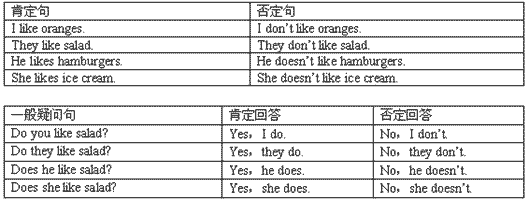用括号内动词的适当形式填空。1. He often( have ) dinner at home.2. Daniel and Tommy( be ) in the Class One.3. We ( not watch ) TV on Monday.4. Nick ( not g-六年级英语
题文
| 用括号内动词的适当形式填空。 |
| 1. He often ( have ) dinner at home. 2. Daniel and Tommy ( be ) in the Class One. 3. We ( not watch ) TV on Monday. 4. Nick ( not go ) to the zoo on Sunday. 5. they ( like ) the World Cup? 6. What they often ( do ) on Saturdays? 7. your parents ( read ) newspapers every day? |
答案
|
l. has 2. are 3. don't watch 4. doesn't go 5. Do, like 6. do, do 7. Do, read |
据专家权威分析,试题“用括号内动词的适当形式填空。1. He often( have ) dinner at h..”主要考查你对 一般现在时,动词单数第三人称,系动词,实义动词,助动词,否定句 等考点的理解。关于这些考点的“档案”如下:
一般现在时,动词单数第三人称系动词实义动词助动词否定句
考点名称:一般现在时,动词单数第三人称
一般现在时:
表示现在经常反复发生的动作、存在的状态或习惯性的动作的时态。可概括为
①经常性或习惯性动作;
②长期存在的特征或状态;
③普遍真理、客观事实等。
构成:
一般现在时用行为动词的原形,但第三人称单数作主语时,动词的词尾要加-S。
a. 表示经常性或习惯性的动作。
例:Li Ming always helps the old man. 李明一直帮助这位老人。
We usually go to school on foot. 我们通常步行上学。
They sometimes go fishing on Sundays. 他们有时周日去钓鱼。
b. 表示永恒不变的事实或真理。
例:A bird flies with wings. 鸟用翅膀飞翔。
c. 用在格言、谚语中。
例:Pride goes before a fall. 骄者必败。- 一般现在时具体用法:
1.表示经常的或习惯性的动作,常与表示频率的时间状语连用。
时间状语:
always,usually,every morning/night/evening/day/week/year,often,sometimes,
occasionally,from time to time,twice a week,rarely,seldom,once a month,hardly,ever,never.
e.g: I leave home for school at 7:00 every morning.
2.表示主语具备的性格、能力、特征和状态。
e.g:I don't want so much.
Ann Wang writes good English but does not speak well.
比较:Now I put the sugar in the cup.
I am doing my homework now.
3.表示客观事实和普遍真理。
e.g :The earth moves around the sun.
Shanghai lives in the east of China.
4.在时间状语从句和条件状语从句中,常用一般现在时代替将来时。
5.表示预先计划或安排好的行为。
6.小说故事用一般现在时代替一般过去时。新闻报道类的内容,为了体现其“新鲜”性,也用一般现在时来表示过去发生的事情。
7.有些表示状态和感觉的动词表示现在发生的具体行为时,只用一般现在时,而不用进行时态。
8.表示现在发生的具体动作或存在的状态
9表示格言或警句中。 e.g Pride goes before a fall. 骄者必败。
注意:此用法如果出现在宾语从句中,即使主句是过去时,从句谓语也要用一般现在时。
例:Columbus proved that the earth is round..
第一句用一般现在时,用于操作演示或指导说明的示范性动作,表示言行的瞬间动作。
再如:Now watch me,I switch on the current and stand back.
第二句中的now是进行时的标志,表示正在进行的动作的客观状况,所以后句用一般现在时。 - 一般现在时用法表:

第三人称单数的构成见下表:
不规则变化have和be动词 变have为has 变be为am,is,are例: have-has; be-am,is,are词
构成
举例
一般情况
词尾+s
动词原形
第三人称单数
work(工作)
stop(停止)works
stops以-ch, -sh, s, x, o结尾
词尾+es
teach(教)
wash(洗)
dress(装扮)
fix(安装)
go(去)teaches
washes
dresses
fixes
goes以“辅音字母+y”结尾
变y为i,再加es
fly(飞翔)
try(尝试)flies
tries 一般现在时的特殊用法:
一些动词可用一般现在时来表达现在进行时:
verbs of the senses: hear,see,taste,smell,feel
verbs of the thinking: believe,know,mean,realize,think,remember
verbs of the linking: dislike,fear,heat,like,love,want
verbs of the possession: belong,have,own,possess
考点名称:系动词
- 系动词:
亦称连系动词,作为系动词,它本身有词义,但不能单独用作谓语,后边必须跟表语,亦称补语(形容词),构成系表结构说明主语的状况、性质、特征等情况。
be(是)是最基本的系动词。小学涉及到的系动词需要掌握的am, is, are
如:I am from Beijing. 我来自北京。
My mother is a teacher. 我的妈妈是一位老师。
除了系动词be,常用的系动词还有look(看起来)、sound(听起来)、feel(感觉到)、become(变成)、smell(闻起来)等。
例:The boy looks very happy. 这个男孩看起来很高兴。
The dish smells good. 这盘菜闻起来很香。
- 最新内容
- 相关内容
- 网友推荐
- 图文推荐
| [家长教育] 孩子为什么会和父母感情疏离? (2019-07-14) |
| [教师分享] 给远方姐姐的一封信 (2018-11-07) |
| [教师分享] 伸缩门 (2018-11-07) |
| [教师分享] 回家乡 (2018-11-07) |
| [教师分享] 是风味也是人间 (2018-11-07) |
| [教师分享] 一句格言的启示 (2018-11-07) |
| [教师分享] 无规矩不成方圆 (2018-11-07) |
| [教师分享] 第十届全国教育名家论坛有感(二) (2018-11-07) |
| [教师分享] 贪玩的小狗 (2018-11-07) |
| [教师分享] 未命名文章 (2018-11-07) |

![Danny apairofskates.[ ]A.hasB. haveC. is-六年级英语](http://www.00-edu.com/d/file/ks/4/1/47/2019-08-24/smallfac5032aba6ffd5133224fbfd6f627641566585773.png)
![I have a telescope; my sister _____ one, too. [ ]A. have B. /C. has-六年级英语](http://www.00-edu.com/d/file/ks/4/1/47/2019-08-24/small95b931d9eba0d6e0d51fcb17c976b6ab1566587233.png)
![Mysister_________ tea.[ ]A.doB.makeC.makes-二年级英语](http://www.00-edu.com/d/file/ks/4/1/47/2019-08-24/smalld9c80030fe676239effad1766f1ca9c91566585454.png)
![John _____________ a stamp for his letter. [ ]A. needB. needsC. needing-五年级英语](http://www.00-edu.com/d/file/ks/4/1/47/2019-08-24/smallcebb0f01dc82000e4d9f8a50418bc5e51566586956.png)
![It'sred.It __________ abandageonit![ ]A. have B. has-五年级英语](http://www.00-edu.com/d/file/ks/4/1/47/2019-08-24/smallcf3a20012c2087fbeb76d9ac03e80fe91566585957.jpg)


